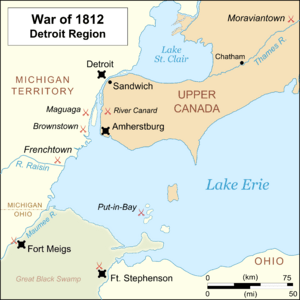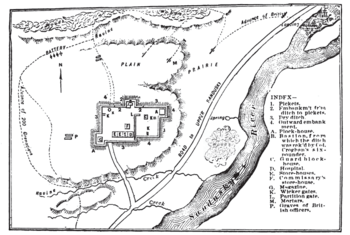Battle of Fort Stephenson facts for kids
Quick facts for kids Battle of Fort Stephenson |
|||||||
|---|---|---|---|---|---|---|---|
| Part of the War of 1812 | |||||||
 |
|||||||
|
|||||||
| Belligerents | |||||||
Tecumseh's confederacy |
|||||||
| Commanders and leaders | |||||||
Robert Dickson (Indian Dept.) |
|||||||
| Strength | |||||||
| 1,400 British regulars and Indians | 160 U.S. regulars | ||||||
| Casualties and losses | |||||||
| 26 killed 41 wounded 29 missing |
1 killed 7 wounded |
||||||
The Battle of Fort Stephenson was an important fight during the War of 1812. It happened in August 1813. American soldiers successfully defended Fort Stephenson against British and Native American forces. This fort was very important because it protected a key supply base. It was located on the Sandusky River in what is now Ohio. Today, the town of Fremont, Ohio is built around where the fort once stood.
Contents
Why the Battle Happened: The Background
After failing to capture Fort Meigs, the British commander, Henry Procter, pulled his troops back. Procter tried a trick to get the American soldiers out of Fort Meigs in July. He staged a fake battle, hoping they would leave the fort to fight. But his plan did not work, so Procter gave up on taking Fort Meigs.
The British and their Native American allies then decided to attack an American supply base. This base was on the Sandusky River and was guarded by Fort Stephenson. They sailed their ships up the river to reach the fort.
Who Was in Charge at Fort Stephenson?
Major George Croghan commanded Fort Stephenson. He had about 160 U.S. soldiers with him. These soldiers were from the 17th U.S. Infantry. William Henry Harrison, the American commander in the Northwest, thought Procter's force was much larger. So, Harrison ordered Croghan to destroy the fort and retreat.
But Croghan believed he could defend the fort and refused to leave. Harrison eventually agreed to let Croghan stay. However, Harrison still worried about the fort. He moved all other available American forces about 10 miles away from Fort Stephenson.
The Battle Begins: What Happened?
Procter did not want a long siege like the one at Fort Meigs. He expected Harrison to send more American soldiers to help Fort Stephenson. So, the British artillery and gunboats moved up the Sandusky River. They started firing cannons at the fort. But their shots did not do much damage.
On August 2, Procter ordered his infantry soldiers to attack. Major Croghan told his defenders to wait. He ordered them not to fire until the attackers were very close. Once the British and Native American forces were within range, the American soldiers opened fire. The fort's cannons also joined in.
The attack failed, and Procter tried several more times. But his soldiers did not have ladders to climb the fort walls. Procter realized his attackers could not get into the fort. He finally called off the attack. Later that night, the allied Native American warriors returned to the battlefield. They carried away their wounded comrades.
The Outcome: Who Won?
The battle was a clear victory for the Americans. Major George Croghan became a hero because of his brave defense. He was promoted to lieutenant colonel.
Both Procter and Harrison faced criticism for their actions in the battle. The British and Tecumseh, a Native American leader, were becoming more aware of Procter's weaknesses as a commander. Harrison was criticized for not fully trying to help Fort Stephenson.
Despite the criticism, the British were defeated. Procter and his forces retreated to Canada. In the months that followed, the Americans won two more important battles. These were the Battle of Lake Erie and the Battle of the Thames.


